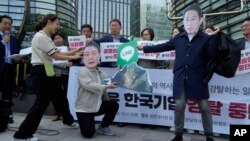Fragile South Korea-Japan ties are being strained yet again after South Korean politicians accused Tokyo of inappropriately pressuring a South Korean company to sell its stake in Line, the do-it-all social media app that has come to dominate digital life in Japan.
Line – which started as a messaging app but is now used for everything from bill-paying to video-sharing – is run by LY Corp., a Tokyo-based joint venture between South Korea’s tech giant Naver and Japan’s Softbank Group.
Japanese regulators have urged LY to reduce its dependence on Naver after the South Korean company experienced a cyberattack that resulted in a massive leak of data, including the personal information of Line users.
While the Japanese government’s recommendations to LY are not legally binding, analysts say such statements of “administrative guidance” carry significant weight in Japan’s business community. Naver itself has confirmed that it is considering “all possibilities,” including the sale of its stake in the company that controls LY.
Although Japanese officials say their actions are driven by information security concerns, South Korean politicians and commentators contend the moves are, at the very least, interference in a South Korean company's foreign investment and, at worst, an infringement on South Korea’s digital sovereignty.
The dispute heightens political pressure on South Korean President Yoon Suk Yeol, who has pursued closer ties with Japan, Korea's former colonial ruler, but whose conservative party suffered a crushing defeat in legislative elections last month.
Yoon says closer cooperation with Japan is needed to deal with shared challenges, such as North Korea. But South Korea’s left-leaning opposition accuses Yoon of being too conciliatory, saying Japan should take further steps to make amends for its brutal 1910-1945 occupation of Korea.
Fierce backlash
Prominent South Korean politicians have pounced on the Line controversy to attack Yoon, framing it as another example of his "surrender diplomacy" and tying it to South Korea’s painful history with Japan.
In a Facebook post, Lee Jae-myung, head of the main opposition Democratic Party of Korea, noted that the Japanese communication minister who issued the regulatory guidance is the descendant of a former top official who helped administer Japan’s colonial rule of Korea.
"While Ito Hirobumi [the ex-Japanese resident-general of Korea] plundered our national territory, his descendants are pillaging our cyber territory,” Lee said.
To protest what he says is Yoon’s weak response, Cho Kuk, a blunt-speaking former justice minister and head of the minor opposition Rebuilding Korea Party, last week visited a group of islands claimed by both South Korea and Japan.
During a fiery speech, Cho accused the Yoon administration of “worshiping Japan” and said the South Korean president had allowed the country to once again become a Japanese colony.
Cho’s visit to the islands, known as Dokdo in Korean and Takeshima in Japan, set off a tense exchange between Japanese and South Korean officials.
After Japan’s foreign ministry lodged a formal protest saying the visit was “totally unacceptable,” South Korea’s foreign ministry dismissed the complaint and criticized Tokyo’s “unjust” claim over the islands.
The South Korean presidential office has vowed to respond “firmly and strongly” to any unfair measures against Korean companies, but lamented that some politicians are using the dispute to stoke “anti-Japan sentiment that damages the national interest.”
The Japanese embassy in Seoul did not respond to a request for comment.
Trilateral meeting
The dispute comes just ahead of an expected meeting later this month between senior leaders of South Korea, Japan, and China – the first such trilateral summit since 2019.
The Korea-Japan tension may be well-timed for China, which has criticized the expanded cooperation between South Korea, Japan, and the United States.
Analysts have said that China may use the meeting to drive a wedge between South Korea and Japan. But Jeffrey Robertson, a professor of diplomatic studies at Seoul’s Yonsei University, said China may conclude it has much to gain simply by re-establishing dialogue with Japan and South Korea — a meeting that excludes the United States.
“I don't think China has to do anything to find cracks in the Japan-Korea relationship. I think those cracks are already present and pretty much filling up with water right now,” Robertson said.
Muted reaction in Japan
In Japan, the Line/Naver dispute has received relatively little attention, says Jeffrey J. Hall, a Japanese politics specialist at the Kanda University of International Studies.
“A lot of news outlets probably wouldn't have even given it much attention if it wasn't for politicians visiting Takeshima/Dokdo,” Hall said.
“In contrast, last year's massive leak of LINE users' personal information was treated as big news in Japan,” he added in a written exchange with VOA.
Yoon has vowed to continue good relations with Japan, but analysts say anti-Japan forces are unlikely to disappear anytime soon.
“Japan is getting a small taste of things to come if the opposition wins the next presidential election,” Hall said.
Lee Juhyun contributed to this report.




